As you can see from watch, l[u][0] must be 0.5, but it returns 0
u = 0
for j in range(n):
if k == j:
continue
l[u][0] = -x[j] / (x[k] - x[j])
l[u][1] = 1 / (x[k] - x[j])
u = u + 1

What's wrong with it?
As you can see from watch, l[u][0] must be 0.5, but it returns 0
u = 0
for j in range(n):
if k == j:
continue
l[u][0] = -x[j] / (x[k] - x[j])
l[u][1] = 1 / (x[k] - x[j])
u = u + 1

What's wrong with it?
The division is not "wrong". It is integer division (a.k.a. floor division).
When you divide two integers, the result is an integer:
>>> 3/4
0
>>> 4/4
1
When you divide two floating-point numbers (numbers with a fractional part), the result is a float:
>>> 3./4
0.75
>>> 4./4
1.0
Note that this "problem" is confined to Python 2. One of the changes in Python 3 is to make normal division coerce to floats:
>>> 3/4 # Python 3 behavior
0.75
and to require a second operator (also in Python >2.2) to achieve integer division:
>>> 3//4
0